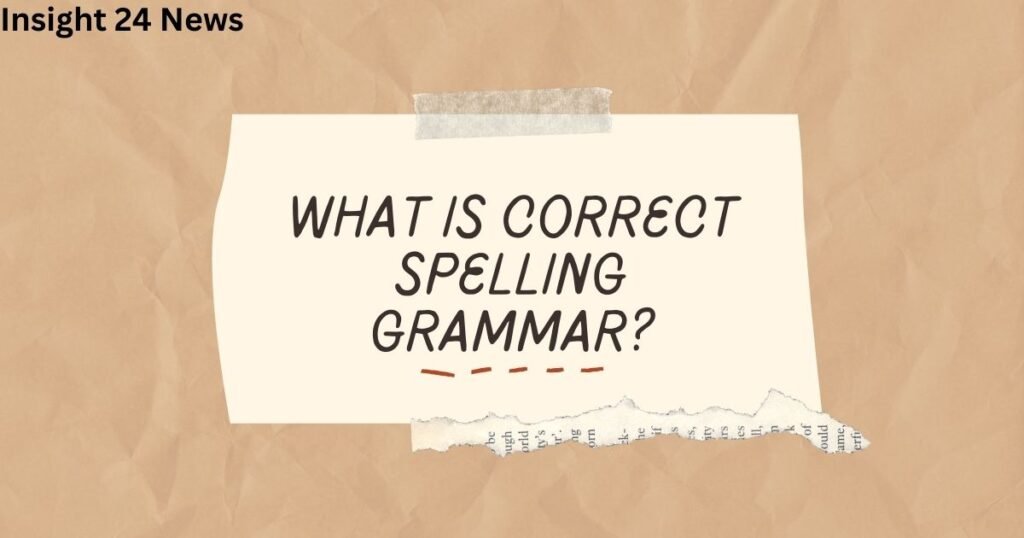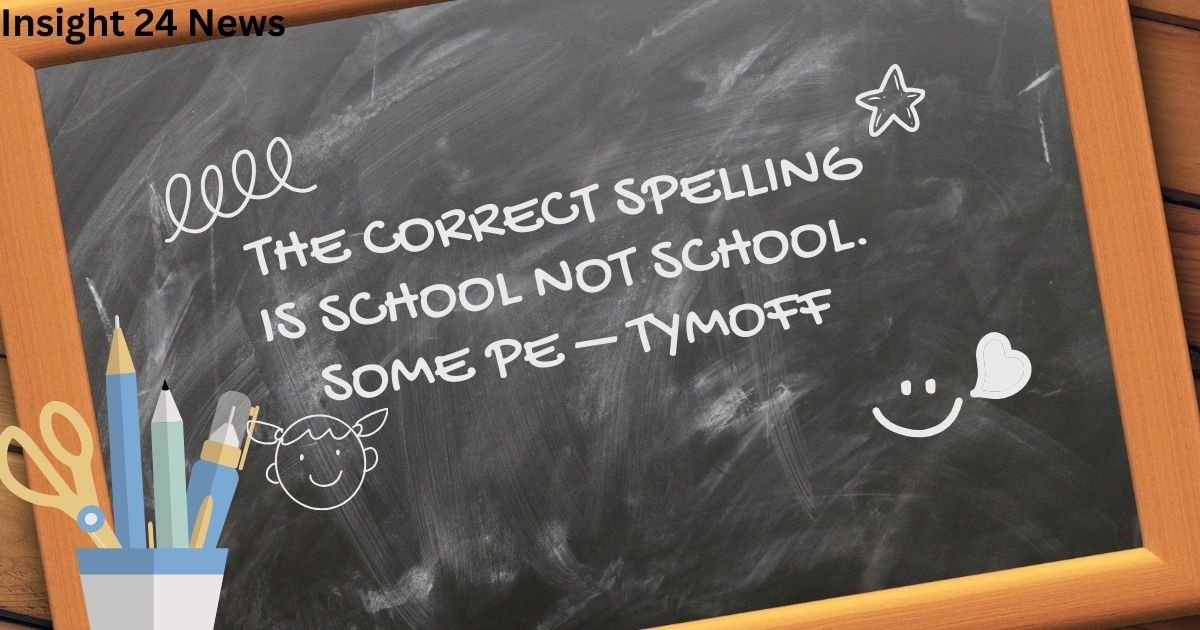Introduction
Spelling plays a crucial role in our daily communication, yet it often becomes a topic of confusion and debate. One of the words that sometimes gets misspelled is “school.” It’s easy to mix up letters or sounds, especially when there are similar-sounding words that can lead to misunderstandings. This article explores why the correct spelling is “school” and clarifies some common misconceptions about the term.
Understanding correct spelling isn’t just about following rules; it’s essential for effective communication. Whether in academic writing, professional correspondence, or casual texts, the way we spell words can influence how our messages are received. Misspellings can undermine our credibility and confuse our readers, so it’s important to pay attention to these details. This article will delve into the historical origins of the word “school,” explain correct spelling grammar, and address why “school” is spelled with “CH.”
Why is School Spelled That Way?
Historical Origins
The word “school” has a rich history that traces back to ancient languages. It originates from the Greek word scholē, which means “leisure” or “that in which leisure is employed.” In ancient Greece, this term was associated with places of learning where philosophical discussions and lectures occurred, often in a leisurely setting. As the Romans adopted the concept, they transformed scholē into scōl, and this adaptation spread throughout Europe.
When the term reached Old English, it morphed into “scol,” reflecting the pronunciation of that time. As the English language evolved through the Middle Ages, the word transformed into “scole,” influenced by the Latin forms. Finally, it settled into the modern spelling “school,” solidifying its role in our language as a place of education and learning.
These historical transformations highlight how language evolves and adapts to cultural shifts, reflecting the importance society places on education. Understanding these roots provides insight into why “school” is spelled as it is today.
Linguistic Influences
The journey of the word “school” through different languages exemplifies the influences of linguistics on spelling. As languages intermingle through trade, conquest, and cultural exchange, words often change in form and pronunciation. The transition from Greek to Latin to Old English demonstrates how sounds and letters adapt to fit new phonetic and grammatical structures.
In Middle English, the addition of “CH” might seem arbitrary, but it was a common practice in English to borrow phonetic elements from other languages. The “CH” sound, prevalent in many English words, contributed to the unique spelling we recognize today.
Moreover, spelling conventions often reflect societal norms and educational practices of their time. As the importance of formal education grew, so did the need for standardized spelling to enhance communication. The spelling of “school” as we know it is a product of historical linguistic influences and social development that have shaped the English language.
What is Correct Spelling Grammar?

Definition of Correct Spelling
Correct spelling refers to the standardized way of writing words that is accepted in a given language. In English, correct spelling helps ensure that words are understood universally among speakers and writers. Spelling rules dictate how letters are arranged to form words, and they can vary significantly from one language to another.
Correct spelling isn’t just about memorization; it also involves understanding phonetics, etymology, and grammar. For instance, certain combinations of letters often produce specific sounds, guiding us in how to spell words correctly. Mastering these conventions is key to effective written communication.
In the case of “school,” knowing its correct spelling involves recognizing its historical roots and phonetic characteristics. By adhering to established spelling norms, writers can avoid common pitfalls that lead to misunderstandings and misinterpretations.
Role of Grammar in Spelling
Grammar plays a significant role in the way we spell words. While grammar primarily concerns the structure and organization of sentences, it also impacts spelling through rules and conventions that guide word formation. For example, understanding parts of speech can inform how words are used in context, which in turn affects spelling.
Moreover, grammar includes rules for punctuation, capitalization, and the agreement of words within a sentence. These elements are crucial for clarity and precision in writing. Spelling is often tied to grammatical categories; for example, some words may change spelling based on tense or plurality, such as “play” and “played.”
In the case of “school,” proper usage within sentences can reinforce its correct spelling. Ensuring that grammar rules are followed helps maintain coherence and promotes better understanding among readers, which ultimately emphasizes the importance of spelling in effective communication.
What is the Full Spelling of School?
Definition and Explanation
The word “school” refers to an institution designed for the teaching of students under the direction of teachers. Schools serve various educational purposes, from primary education to higher learning. The term encompasses a range of learning environments, including public schools, private schools, and specialized institutions for vocational training or arts education.
Understanding the full meaning of “school” goes beyond its spelling. It represents a place where knowledge is imparted and critical thinking is encouraged. The concept of school is deeply embedded in societies, influencing cultural values and shaping future generations.
Furthermore, the word has various contexts and interpretations depending on the educational system and cultural framework. Schools can also symbolize community, growth, and the pursuit of knowledge, making their proper representation in writing vital.
Variations and Related Terms
In addition to “school,” there are several related terms that illustrate the word’s broader context. For instance, “schooling” refers to the process of receiving education, while “schoolhouse” describes the physical building where educational activities occur.
Words like “schoolmate” denote relationships formed within educational environments, emphasizing the social aspect of schooling. Other variations include “scholar,” referring to someone who engages in serious study, and “scholarly,” which pertains to academic pursuits.
These variations highlight the versatility of the term “school” and its connections to various aspects of education and learning. Understanding these related terms not only enriches our vocabulary but also deepens our comprehension of the educational landscape and its impact on society.
Why is School Spelled with CH?
Phonetic Reasoning
The spelling of “school” with “CH” may seem puzzling at first glance, but it can be understood through phonetic reasoning. In English, the “CH” combination often represents a specific sound, typically associated with words like “chair” or “chocolate.”
In the case of “school,” the “CH” represents a sound that is integral to how we pronounce the word. This phonetic aspect influences the spelling we use today. The decision to adopt “CH” in “school” reflects a broader trend in English to incorporate sounds from other languages and adapt them into its spelling conventions.
Phonetic spelling not only aids in pronunciation but also helps maintain the unique characteristics of words as they evolve. Understanding the phonetic roots of words can enhance our grasp of language and spelling.
Comparative Analysis
To understand why “school” is spelled with “CH,” it’s beneficial to compare it with similar words. For instance, consider the word “schooner,” which also features “sch” and denotes a type of sailing vessel. Here, the “sch” reflects the same phonetic roots, emphasizing how spelling can align with sound patterns.
Another comparison can be made with “schedule.” The differing pronunciations between American and British English, which impact spelling, showcase the fluid nature of language. In both cases, the spelling reflects historical and phonetic influences that contribute to how these words are recognized and understood.
Through these comparisons, we see how spelling conventions are not arbitrary but rather tied to linguistic history and phonetic patterns. This insight reinforces the idea that understanding spelling can deepen our appreciation for language as a dynamic and evolving system.
Conclusion About The correct spelling is school not school. some pe – tymoff
In summary, the correct spelling of “school” is not just a matter of rote memorization; it’s rooted in a rich historical context and linguistic evolution. From its Greek origins to its modern usage, “school” exemplifies the importance of understanding the journey words take as they become part of our language.
Spelling holds significant importance in education and communication. By adhering to correct spelling rules and grammar, we can enhance our written communication and ensure our messages are clear. As we navigate the complexities of language, it’s crucial to appreciate the nuances of spelling, as they reflect the depth and richness of our communication.
You Also Like It:
It Is Not Wisdom But Authority That Makes A Law. T – Tymoff
